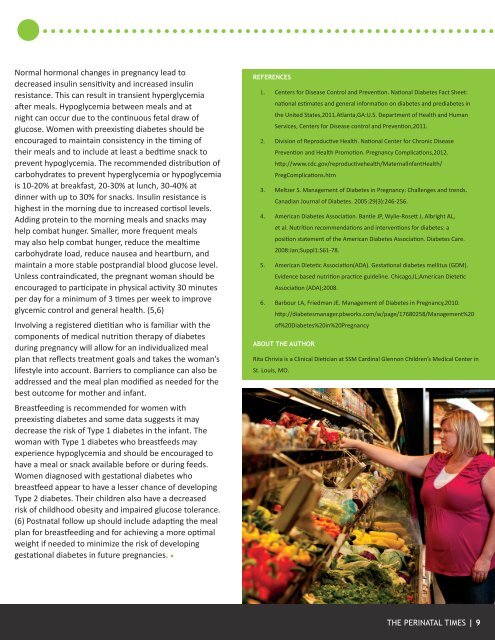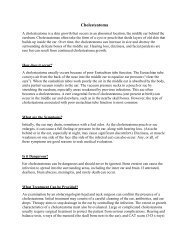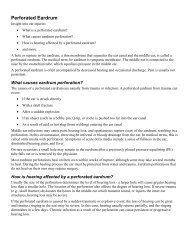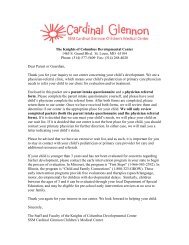perinatal-times_2013-03_print_and_read - SSM Cardinal Glennon ...
perinatal-times_2013-03_print_and_read - SSM Cardinal Glennon ...
perinatal-times_2013-03_print_and_read - SSM Cardinal Glennon ...
Create successful ePaper yourself
Turn your PDF publications into a flip-book with our unique Google optimized e-Paper software.
Normal hormonal changes in pregnancy lead todecreased insulin sensitivity <strong>and</strong> increased insulinresistance. This can result in transient hyperglycemiaafter meals. Hypoglycemia between meals <strong>and</strong> atnight can occur due to the continuous fetal draw ofglucose. Women with preexisting diabetes should beencouraged to maintain consistency in the timing oftheir meals <strong>and</strong> to include at least a bedtime snack toprevent hypoglycemia. The recommended distribution ofcarbohydrates to prevent hyperglycemia or hypoglycemiais 10-20% at breakfast, 20-30% at lunch, 30-40% atdinner with up to 30% for snacks. Insulin resistance ishighest in the morning due to increased cortisol levels.Adding protein to the morning meals <strong>and</strong> snacks mayhelp combat hunger. Smaller, more frequent mealsmay also help combat hunger, reduce the mealtimecarbohydrate load, reduce nausea <strong>and</strong> heartburn, <strong>and</strong>maintain a more stable postpr<strong>and</strong>ial blood glucose level.Unless contraindicated, the pregnant woman should beencouraged to participate in physical activity 30 minutesper day for a minimum of 3 <strong>times</strong> per week to improveglycemic control <strong>and</strong> general health. (5,6)Involving a registered dietitian who is familiar with thecomponents of medical nutrition therapy of diabetesduring pregnancy will allow for an individualized mealplan that reflects treatment goals <strong>and</strong> takes the woman’slifestyle into account. Barriers to compliance can also beaddressed <strong>and</strong> the meal plan modified as needed for thebest outcome for mother <strong>and</strong> infant.Breastfeeding is recommended for women withpreexisting diabetes <strong>and</strong> some data suggests it maydecrease the risk of Type 1 diabetes in the infant. Thewoman with Type 1 diabetes who breastfeeds mayexperience hypoglycemia <strong>and</strong> should be encouraged tohave a meal or snack available before or during feeds.Women diagnosed with gestational diabetes whobreastfeed appear to have a lesser chance of developingType 2 diabetes. Their children also have a decreasedrisk of childhood obesity <strong>and</strong> impaired glucose tolerance.(6) Postnatal follow up should include adapting the mealplan for breastfeeding <strong>and</strong> for achieving a more optimalweight if needed to minimize the risk of developinggestational diabetes in future pregnancies. ●REFERENCES1. Centers for Disease Control <strong>and</strong> Prevention. National Diabetes Fact Sheet:national estimates <strong>and</strong> general information on diabetes <strong>and</strong> prediabetes inthe United States,2011.Atlanta,GA:U.S. Department of Health <strong>and</strong> HumanServices, Centers for Disease control <strong>and</strong> Prevention,2011.2. Division of Reproductive Health. National Center for Chronic DiseasePrevention <strong>and</strong> Health Promotion. Pregnancy Complications,2012.http://www.cdc.gov/reproductivehealth/MaternalInfantHealth/PregComplications.htm3. Meltzer S. Management of Diabetes in Pregnancy: Challenges <strong>and</strong> trends.Canadian Journal of Diabetes. 2005:29(3):246-256.4. American Diabetes Association. Bantle JP, Wylie-Rosett J, Albright AL,et al. Nutrition recommendations <strong>and</strong> interventions for diabetes: aposition statement of the American Diabetes Association. Diabetes Care.2008:Jan;Suppl1:S61-78.5. American Dietetic Association(ADA). Gestational diabetes mellitus (GDM).Evidence based nutrition practice guideline. Chicago,IL;American DieteticAssociation (ADA);2008.6. Barbour LA, Friedman JE. Management of Diabetes in Pregnancy,2010.http://diabetesmanager.pbworks.com/w/page/17680258/Management%20of%20Diabetes%20in%20PregnancyABOUT THE AUTHORRita Chrivia is a Clinical Dietician at <strong>SSM</strong> <strong>Cardinal</strong> <strong>Glennon</strong> Children’s Medical Center inSt. Louis, MO.THE PERINATAL TIMES | 9
















